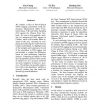Free Online Productivity Tools
i2Speak
i2Symbol
i2OCR
iTex2Img
iWeb2Print
iWeb2Shot
i2Type
iPdf2Split
iPdf2Merge
i2Bopomofo
i2Arabic
i2Style
i2Image
i2PDF
iLatex2Rtf
Sci2ools
COLING
2010
2010
A comparison of unsupervised methods for Part-of-Speech Tagging in Chinese
We conduct a series of Part-of-Speech (POS) Tagging experiments using Expectation Maximization (EM), Variational Bayes (VB) and Gibbs Sampling (GS) against the Chinese Penn Treebank. We want to first establish a baseline for unsupervised POS tagging in Chinese, which will facilitate future research in this area. Secondly, by comparing and analyzing the results between Chinese and English, we highlight some of the strengths and weaknesses of each of the algorithms in POS tagging task and attempt to explain the differences based on some preliminary linguistics analysis. Comparing to English, we find that all algorithms perform rather poorly in Chinese in 1-to-1 accuracy result but are more competitive in many-to-1 accuracy. We attribute one possible explanation of this to the algorithms' inability to correctly produce tags that match the desired tag count distribution.
Algorithms | Chinese Penn Treebank | COLING 2010 | Computational Linguistics | Preliminary Linguistics Analysis |
| Added | 13 May 2011 |
| Updated | 13 May 2011 |
| Type | Journal |
| Year | 2010 |
| Where | COLING |
| Authors | Alex Cheng, Fei Xia, Jianfeng Gao |
Comments (0)

